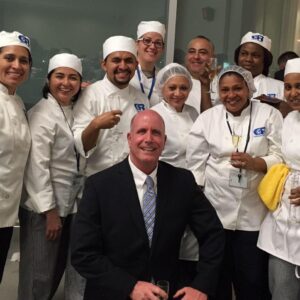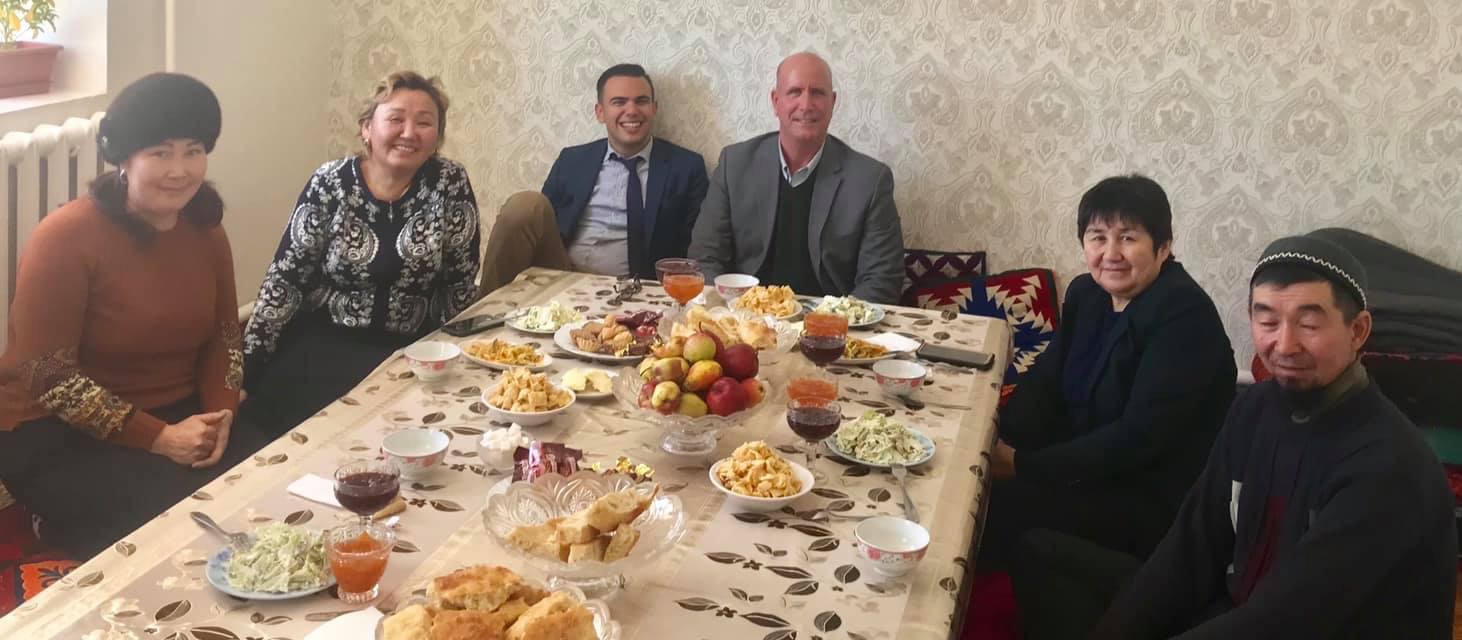By Caitlin James ’01
When asked how the Peace Corps has changed in the past 35 years, Ryan Monroe, M.A. ’84, Ph.D. ’06, reflects thoughtfully. As the current director of programming and training for the Peace Corps in Kyrgyzstan and a returned Peace Corps volunteer who trained rural literacy volunteers in Honduras in the mid-80s, Monroe brings a unique perspective to the question.
He laughs as he recalls that when he was a volunteer in Honduras, he was told only the name of a town, and it was up to him to find a place to live.
“The training is a lot better now than when I was in it [as a volunteer]. It’s really on target and well thought out,” Monroe begins. “Once we decide which village a volunteer is going to work in, multiple people go to train the community, train the families they’ll live with. Selecting the right family, the right house—a lot of careful thought is put into it.”
In addition, Monroe had a license and rode a motorcycle while he was in Honduras—something the Peace Corps now forbids. The more cautious approach has resulted in fewer tragedies involving volunteers, according to Monroe.

Monroe comes to his new post with over 30 years of experience in immigrant education in California and the Washington, D.C., area and three degrees in the field, including two from UMBC: an MA in instructional systems development in bilingual education and a Ph.D. in language, literacy, and culture. His prior administrative posts at the Carlos Rosario International Public Charter School in Washington, D.C.—the first public charter school for adult immigrants in the United States—prepared him particularly well for the job in Kyrgyzstan.
“In Kyrgyzstan, the program is all teaching English, so as a principal at Carlos Rosario, it was all about English instruction, so it’s a very good match,” Monroe says.
When Monroe arrived in Kyrgyzstan last October, one of his first responsibilities was to play a supervisory role in the 11-week pre-service training of about 40 newly-arrived trainees. In addition to managing the logistics of the annual training in Kyrgyz language and culture and English instruction, he also gets to know the trainees, before they officially become “volunteers.” Monroe says he applies what he learned about training design at UMBC when developing training programs in Kyrgyzstan.
As a doctoral student at UMBC, Monroe did qualitative research involving 5th grade Latino students and their families in Prince George’s County, Maryland, focusing on their experiences with standardized testing. He later used his research to create workshops to explain state assessments to parents.
Although Monroe completed his Ph.D. in 2006, Sarah Shin, UMBC associate provost for academic affairs, doesn’t even stop to take a breath when asked to describe Monroe, one of her very first doctoral advisees back when she was an associate professor of education.
“Ryan really approached that whole subject (of testing) very humanistically, looking at it from where the students were,” Shin says. “I learned a lot about the families because his dissertation had to do with really meeting the needs of ESOL students in terms of accommodations and family issues, and I felt like he really brought such richness to the whole topic.”
“As a Peace Corps director you really have to be thinking creatively about a lot of things.
Ryan is perfect for that kind of position, and I think Peace Corps
lucked out in getting him.” — Sarah Shin
Monroe is one of three Americans working with 30 Kyrgyz Peace Corps staff in the capital, Bishkek. He finds the work enriching but challenging—just what he had hoped for as he prepares to retire in four years. And he’s studying Russian with a tutor so he can get around better in Bishkek.
“I live alone and work in English all day, and I think being 60, I’m more forgetful and have to practice the words a lot more than I did learning Spanish,” he explains. “I love writing in Cyrillic, but it’s a very complicated language.”
Another challenge Monroe faces is being a gay man in a post-Soviet country, where it has been like stepping back to a time in the States when the community was underground. “There’s a strong connection to Russia, and Russia is not accepting of the LGBTQ+ community legally and socially,” Monroe says.
Despite all this, Monroe says he is out to the Peace Corps staff and that they are looking forward to meeting his husband, Victor, when he visits Kyrgyzstan for the first time this fall. He also notes that the Peace Corps as an entity and the U.S. Embassy are very supportive of LGBTQ+ rights.
Shin says it’s no stretch of the imagination to envision Monroe having an impact in Kyrgyzstan.
“As a Peace Corps director you really have to be thinking creatively about a lot of things,” Shin says. “He needs to be able to navigate cross cultural global things very well, and Ryan is perfect for that kind of position, and I think Peace Corps lucked out in getting him.”
Images provided by Ryan Monroe. Header image: Monroe, center right, visits with Peace Corps volunteers at a host family’s home.
Tags: COEIT, GraduateSchool, IS, LLC

